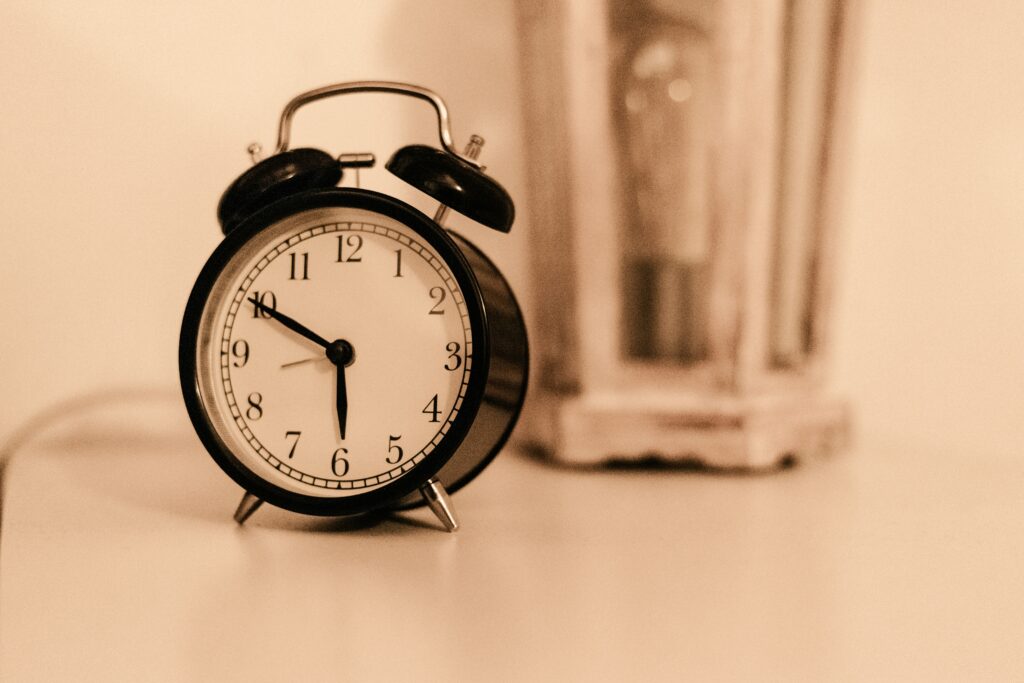Did you know that if you miss your sleep window on any given night because of some reason, you actually miss the window of growth hormone release on that particular night?
It means your body won’t be able to properly get rid of any toxicity, support muscle repair, heal and restore nerve cells and tissues, including brain cells, therefore accelerating your aging process. And all of this will happen because you didn’t maintain a consistent bedtime routine.
A missed sleep window can cost you more than just an adequate nightly rest. As per the National Health 2022 review, poor sleep quality has been shown to affect many physical and cognitive conditions of learning, performing tasks, and processing procedural information.
Hence, creating a bedtime routine that involves tools and practices that align with your internal cycle and living choices becomes necessary for getting a deep restful night’s sleep and maintaining your long-term health. But first, let’s learn what a sleep window is and why managing it is important.
What Is a Sleep Window?
A sleep window is a specific time frame during the day in which your body is naturally primed to fall asleep easily. It is a particular period when your sleep drive is in alignment with your internal clock, making it an ideal phase for you to enter into a deeper and more restorative slumber. This window is greatly influenced by your internal clock called circadian rhythm.
For different people, their sleep cycle varies because of their lifestyle choices and sleeping habits. You can learn when you will approach your sleep window by paying attention to bodily cues, like when you feel drowsy, less alert, and your body becomes lax.
It should be considered a critical time window because once it’s missed, you are likely to stay awake for quite a while. Respecting your sleep window can help you regulate your internal rhythm, sleep quality and enhance your daily productivity.
But if you miss your sleep window and stay awake consistently for a longer period of time, the effect of sleep deprivation can hit you sooner. You have trouble focusing on your daily work tasks, have frequent mood swings, make your emotions unstable, and also affect your metabolism process, which can lead to several health issues.
Why Creating a Bedtime Routine Important for Managing Your Sleep Window?
Image Credit to Annie Spratt on Unsplash
Forming a consistent bedtime routine plays a major role in managing your sleep window efficiently, but the lack of having one can also play a role in throwing it off as well. Your sleep cycle and internal clock are inherently interlinked, which directs many bodily functions. So, it is critical that you emphasize creating one for managing your health better.
1. Reduces Sleep Onset Latency
Sleep onset latency is a term used in sleep science to describe the time it takes for a person to fall asleep after they get ready to sleep or lay in bed. For different people, this time frame differs from their lifestyle to how they choose to spend time leading up to bedtime.
Your sleep habits also determine how fast you can fall asleep and stay asleep as well. By following a sequence of pre-sleep practices or rituals every night, you are tipping off your body and brain that it’s time to wind down and prepare for rest, which helps to reduce your sleep onset latency.
2. Adequate Growth Hormones Release
Human growth hormone is a vital hormone secreted by the anterior lobe of the pituitary gland located at the base of our brain. It is like the conductor of an orchestra, directing various processes in our body that ensure harmonious growth and functioning.
Its main role is to fuel the development of bone structure and muscle mass in adolescence and childhood when the secretion of growth hormone is at its peak. As we age, it helps to keep your blood sugar levels normal, regulate the metabolism process, and repair and restore cells.
Growth hormone is released in a pulsatile secretion pattern in our body through stimulation like exercise, stress, and during the first half of your sleep. Its proper release is essential for our body to recover from any injury and maintain long-term health.
Sticking to a consistent nighttime routine naturally allows you to fall asleep at the most optimal time of your body. When you sleep at your body’s natural onset of the sleep cycle, which is your sleep window, it ensures that you catch up to your window of growth hormone release as well.
3. Regulates Circadian Rhythm
A consistent nighttime routine that involves qualitative sleeping habits is a basic need for better sleep. Your quality of sleep also greatly influences the circadian rhythm, which is our body’s internal master clock behind preparing and keeping our body on track with environmental changes.
When you create a bedtime routine that is aligned with your natural sleep window, it ensures that you go to bed and wake up at a consistent time each day, this also keeps your circadian rhythm in sync as well as several bodily functions.
4. Easier To Fall and Stay Asleep
When your daily nighttime routine isn’t stable, it keeps disrupting your sleep quality. A long-term continuous disruption in sleep, even in healthy individuals can increase the likelihood of developing disorders like hypertension, cardiovascular disease, type 2 diabetes, and lipid disorders.
Following a regular bedtime routine promotes a deeper and more restorative sleep cycle. It ensures that you fall asleep with no trouble, and also makes sure you stay asleep and get sufficient rest.
6 Tips to Create Your Bedtime Routine That Aligns With Your Sleep Window
Image Credit to Yuris Alhumaydy on Unsplash
Every person has different requirements and ways of living. So, we cannot follow each other’s routine like a daily template and make it work for us. If you have been doing it all this time, it isn’t going to work.
The only way to establish a perfect bedtime routine for you is to customize it as per your lifestyle. And the goal is to start preparing your body a few hours before to catch up on your internal clock.
Creating a bedtime routine can help you align your sleep schedule with your natural sleep window, enabling you to achieve your daily required sleep, which helps you maintain proper physical health, mental well-being, and cognitive abilities in the long run.
1. Stick to a Consistent Bedtime Schedule
Our body’s every single cell and neuron runs on circadian rhythm. It is a naturally built-in system in our body that makes sure that every bodily function runs on its scheduled time, like appetite, digestion, hormone release, including sleep.
When your sleeping schedule is disrupted, you don’t only miss your sleep window, but it affects all the other bodily functions as well. Which in the long run affects your physical and mental health.
Therefore, creating a bedtime routine of sleeping at night and waking up in the morning at the same time helps your body to regulate the inner clock which manages the melatonin secretion.
A sustainable pattern of sleep habits also ensures that you fall asleep and stay asleep without any trouble, this also adds to your vitality and energy level for the next day’s performance as well.
2. Avoid Exposure to Bright Lights
Our sleep and wakefulness cycle is controlled by light exposure in our environment. Because of this, exposure to the bright lights at different hours of the day can impact your internal clock differently.
During the day, you need more than 10,000 lux (measure of light density) of light exposure to keep you awake and your circadian rhythm regulated. But after sunset, it needs only a few hundred lux to shift your sleep rhythm in your body.
In one of the Huberman Lab podcasts, Andrew Huberman, Ph.D., associate neurobiology professor at Stanford University School of Medicine, has explained how differently light exposure to your eyes can affect you in the morning and later in the day.
So try avoiding bright lights a few hours before your bedtime, including overhead fluorescent lights.
3. Avoid Any Stimulants Before Bed
Few people function on caffeine. To keep themself working, people gulp down coffee throughout the day.
On average, a person drinks four to five glasses of coffee a day, which is roughly about 400 milligrams of caffeine. Although caffeine might help you stay awake during the day, it can cause a later caffeine crash. A later afternoon slump dips your energy level, which makes you feel the need to intake more caffeine, which can disrupt your sleep later.
Similarly, alcohol can also reduce your sleep quality, since it is considered a REM sleep suppressant. Drinking alcohol too close to your bedtime can delay sleep latency and cause more disturbance in sleep.
4. Wind Down With Relaxing Pre-Sleep Activities
We all live in sleep-deprived countries. Whenever any pressing issue or work stress arises, your sleep is the first thing that is sacrificed. As a result, sleep disorders like insomnia, sleep apnea, and anxiety are becoming a common complaint.
Though for some people sleep problems can be an inevitable work hazard, what we can do is build better sleeping habits, so that we can control its effects on our health and sleep.
To make yourself drift off into sleep more easily, create a relaxation response routine. The time leading up to your bed is important for promoting better sleep.
Try spending this time with activities that further encourage deeper relaxation, like deep breathing exercises, progressive muscle relaxation, mindfulness meditation, or non-sleep deep rest (NSDR) to help you shut down release of stress hormones in your bloodstream, and also signal your body that it’s time to unwind and prepare for bed.
5. Don’t Eat Heavy Meal Closer to Your Bedtime
Eating heavy meals or frequent snacking closer to your bedtime can make it difficult for you to have a well-rested nightly sleep.
When you consume dinner that is high in fat or carbohydrates, your body starts to work to digest it rather than preparing you for sleep. It shifts your body’s internal clock, and since our metabolism process is slower during the night, it even increases the chances of obesity and other metabolic disorders.
Also try not to lie down immediately after having a heavy dinner as it can cause an uncomfortable burning sensation in your chest when your stomach acid makes its way back into the esophagus, (your food pipe), which keeps you awake at night.
6. Optimize Your Sleep Environment
Your sleep environment has a major influence on catching up on your sleep window.
If your surroundings are too noisy or not comfortable, try optimizing your environment as your bedtime routine to promote better sleep. Make your bedroom dark as much as you can, block out any external noises, and make your room cool.
Tips for Balancing Sleep Window in Shift Workers and Jet Lag
Unconventional working hours and traveling across different time zones can turn your internal clock upside-down. Individuals functioning this way not only are working against their body’s natural rhythms but also trying to alter them, which can cause detrimental effects on their health and make them prone to shift work disorder.
Shift work disorder is a condition that not only makes falling asleep harder after shift work is over but also causes cognitive impairment that can hinder their ability to perform at work, making them more sensitive to mistakes and even accidents.
As per the 2023 review, about 27% of shift workers who already have sleep problems progress into shift work disorders, which causes several health consequences and difficulty in performing daily work.
While there is little you can do about things called life demands, what you can do is find practices and tools that can help you manage your symptoms better and your overall quality of sleep and life.
Image Credit to Sixteen Miles Out
1. Stay Consistent With Your Schedule
Balancing a consistent schedule and your sleep window is often a challenge for people who work night shifts or other rotating shifts.
If you can, try to avoid taking any swing swift in which you are on one shift for a few days and then on another for a few days. This type of disrupted shift can throw off your circadian rhythm and cause irregular spikes in cortisol levels throughout the day. And even if you are often taking night shifts, try to keep that schedule of sleeping and waking even on your week offs.
2. Be Mindful of Light Exposure
Light exposure significantly affects your internal clock and sleep window. Therefore, make sure to expose yourself to bright lights (preferably sunlight) at the beginning of your shift to signal your body it’s time to stay awake. Conversely, avoid bright lights a few hours closer to bedtime to cue your body for sleep.
3. Optimize Sleep Environment
Creating a sleep environment that makes it easier to fall asleep is essential for shift workers. If you are to sleep during the daytime, make your bedroom dark and at a cooler temperature, also try using sleep mask to create dark environment . And if your sleep is disturbed by outside noises, use noise-canceling earplugs or white noise machines.
4. Seek Out Help
If the complexity of your job and inability to fall asleep is affecting your daily life, it might be beneficial to seek guidance from healthcare professionals. They can provide personalized guidance and potentially recommend treatments like light therapy to regulate your sleep pattern.
5. Getting Over Jet Lag
If you often travel across different time zones for work or love to go on vacations for weeks, prepare your body a few days ahead by shifting your sleep schedule closer to the time zone of your destination. A sudden change in time can cause difficulties in falling and staying asleep, resulting in fatigue, irritability, and digestive upsets. Try eating on a local schedule to make your body gradually adapt to this new time zone and get over your jet lag symptoms.
Maximize Your Sleep Quality With Well-Executed Bedtime Routine
Sleep is a necessity for every living being. It is important for optimizing our cognitive stability by promoting mental and emotional well-being; and maintaining physical health by repairing and restoring our organs and cells; therefore partaking in sustaining our optimum health and longevity. Therefore, crafting a bedtime routine considering your set of circumstances becomes crucial for staying in line with the sleep window.





